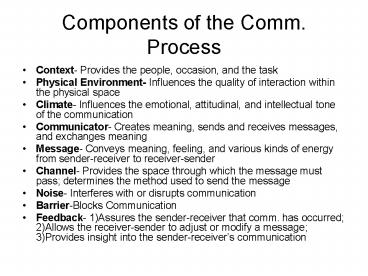Components of the Comm' Process - PowerPoint PPT Presentation
1 / 8
Title:
Components of the Comm' Process
Description:
Physical Environment- Influences the quality of interaction within ... Sender Encodes/ Receiver Decodes. Receiver Decodes/ Sender Encodes. Message. Transmits ... – PowerPoint PPT presentation
Number of Views:20
Avg rating:3.0/5.0
Title: Components of the Comm' Process
1
Components of the Comm. Process
- Context- Provides the people, occasion, and the
task - Physical Environment- Influences the quality of
interaction within the physical space - Climate- Influences the emotional, attitudinal,
and intellectual tone of the communication - Communicator- Creates meaning, sends and receives
messages, and exchanges meaning - Message- Conveys meaning, feeling, and various
kinds of energy from sender-receiver to
receiver-sender - Channel- Provides the space through which the
message must pass determines the method used to
send the message - Noise- Interferes with or disrupts communication
- Barrier-Blocks Communication
- Feedback- 1)Assures the sender-receiver that
comm. has occurred 2)Allows the receiver-sender
to adjust or modify a message 3)Provides insight
into the sender-receivers communication
2
Communication Process
Context, Physical Environment, Climate
Interaction
Sender/ Receiver
Receiver/ Sender
Context, Physical Environment, Climate
3
Communication Process
Context, Physical Environment, Climate
Message
Sender/ Receiver
Receiver/ Sender
Intentional/ Unintentional
Actual
Content Feelings Relationships
Context, Physical Environment, Climate
4
Communication Process
Context, Physical Environment, Climate
Barriers
Feedback
Noise
Barriers
Noise
Noise
Message
Sender Encodes/ Receiver Decodes
Receiver Decodes/ Sender Encodes
Transmits Feedback
Acquires Data
Transmits
Acquires
Noise
Noise
Noise
Noise
Feedback
Context, Physical Environment, Climate
5
Communication Requires You to
- Understand the Context (people, occasion and
task) - Define your Role (part played in a specific
setting or situation) in the Conversation - Discover Communication Norms (stated or implied
expectations) - Set the standard (established level of
requirement or excellence) based on self,
listener, occasion, and task.
6
Principles of Communication
- Transactional (involves an exchange)
- Complex
- Interactive (Involves a series of complicated and
interrelated processes that affect each other) - Symbolic (Meaning is communicated through the use
of symbols that are always open for
interpretation) - Personal and Cultural (Words and gestures are
symbols for meaning and feeling, they are very
personal) - Irreversible (once you have sent a message, it
cannot be taken back. You can only send
additional messages to correct it.) - Impossible to Duplicate (Each interaction is
unique) - Circular (Communication involves original
messages and feedback to those messages) - Purposeful (Theres always a reason behind and
intentional message.
7
Principles of Comm. Cont.
- Unavoidable (its impossible to NOT communicate)
- Continuous (communication is ongoing)
- Learned (communication skills are mainly learned
through behaviors)
8
Communication Process
__________,_____________,________
______
______
_____
__________
________ _______
______ _______
______ _______
______ ______
___________
_______
_______
___________































